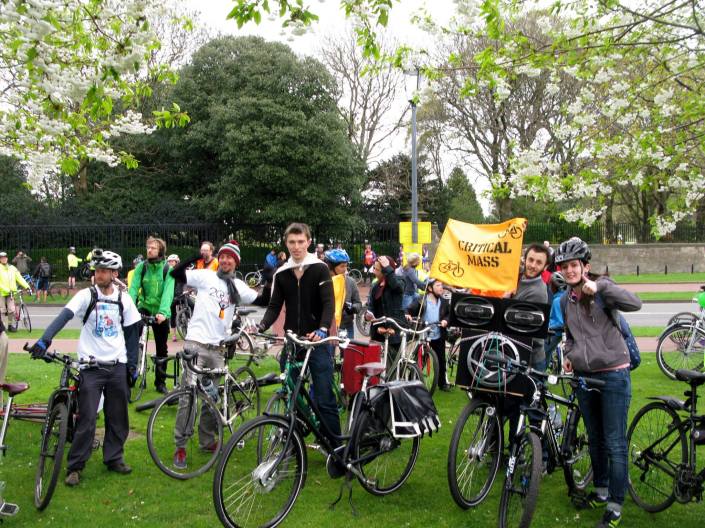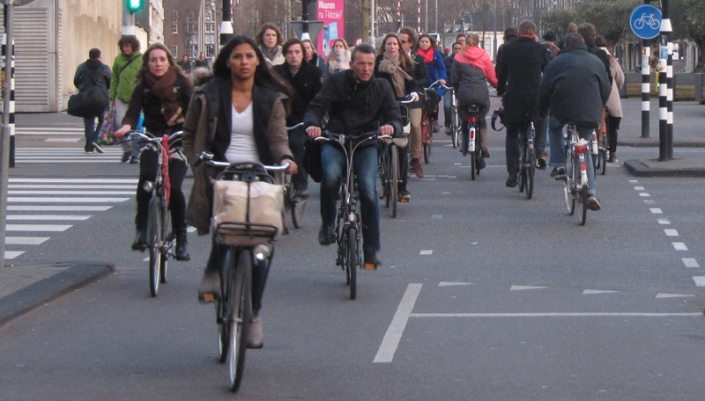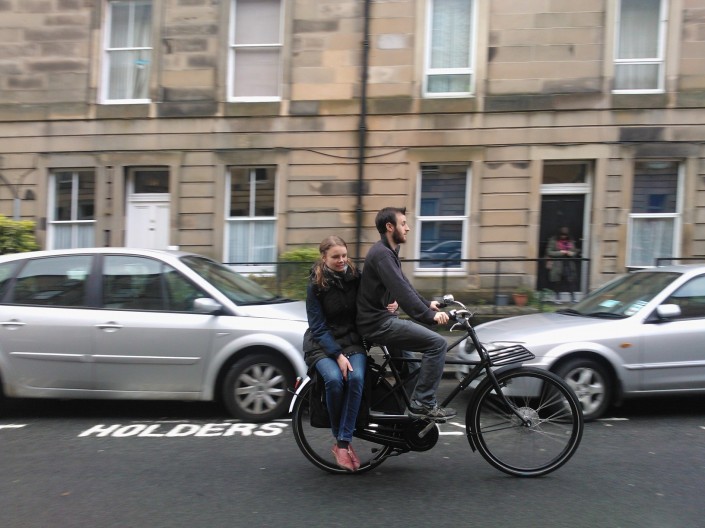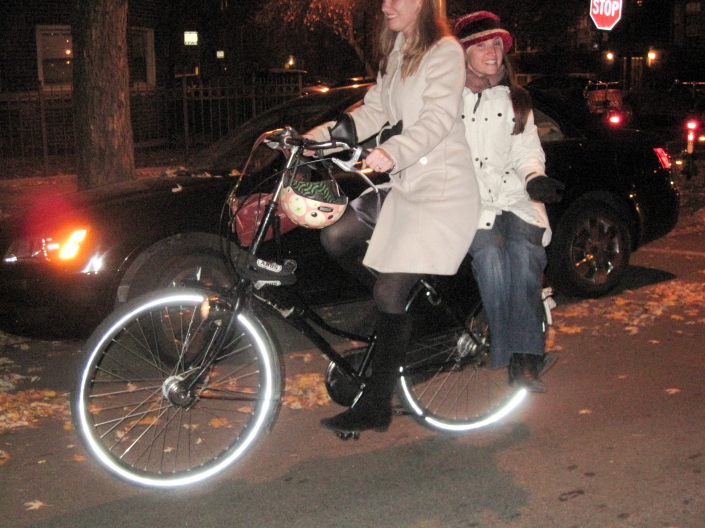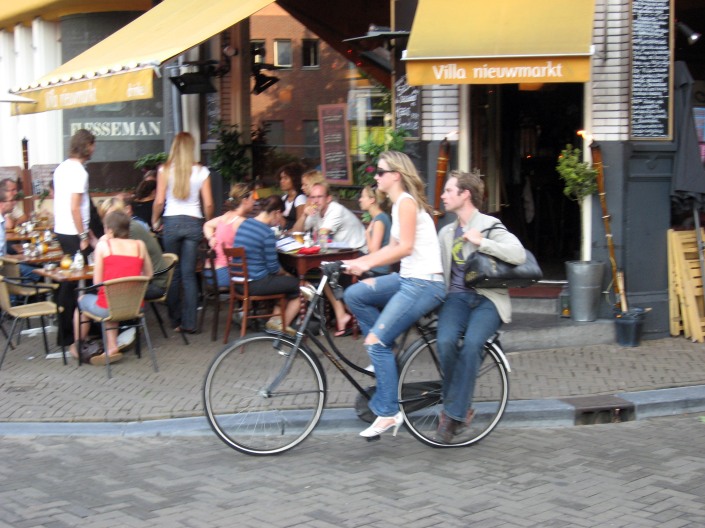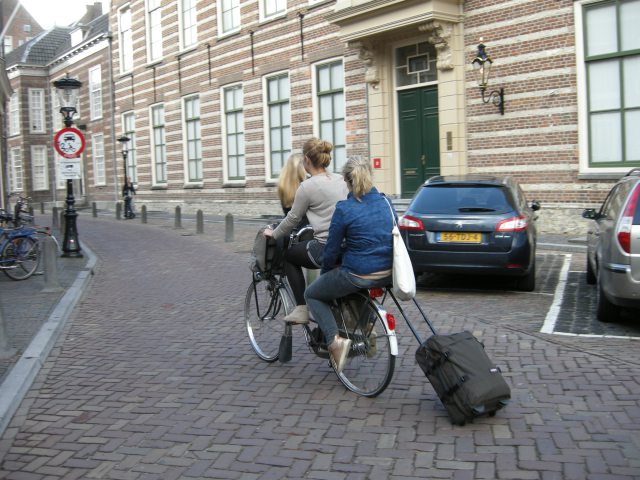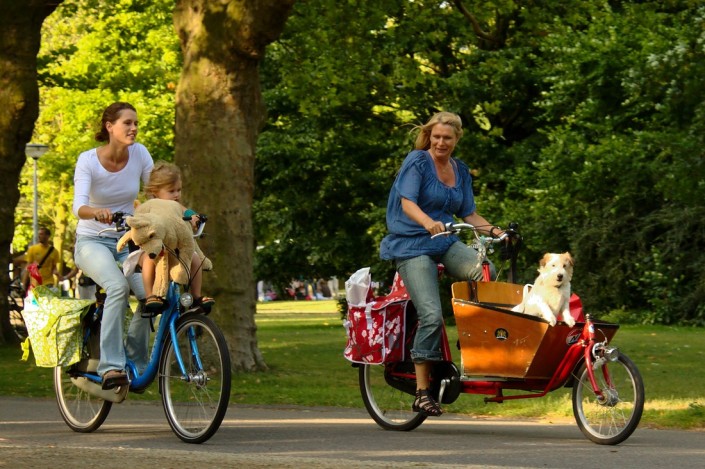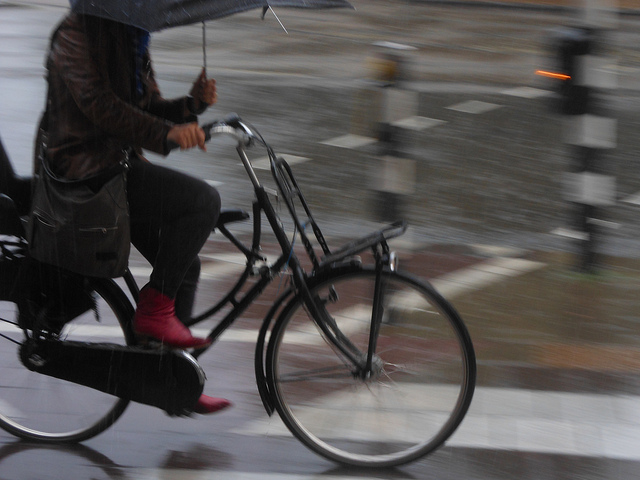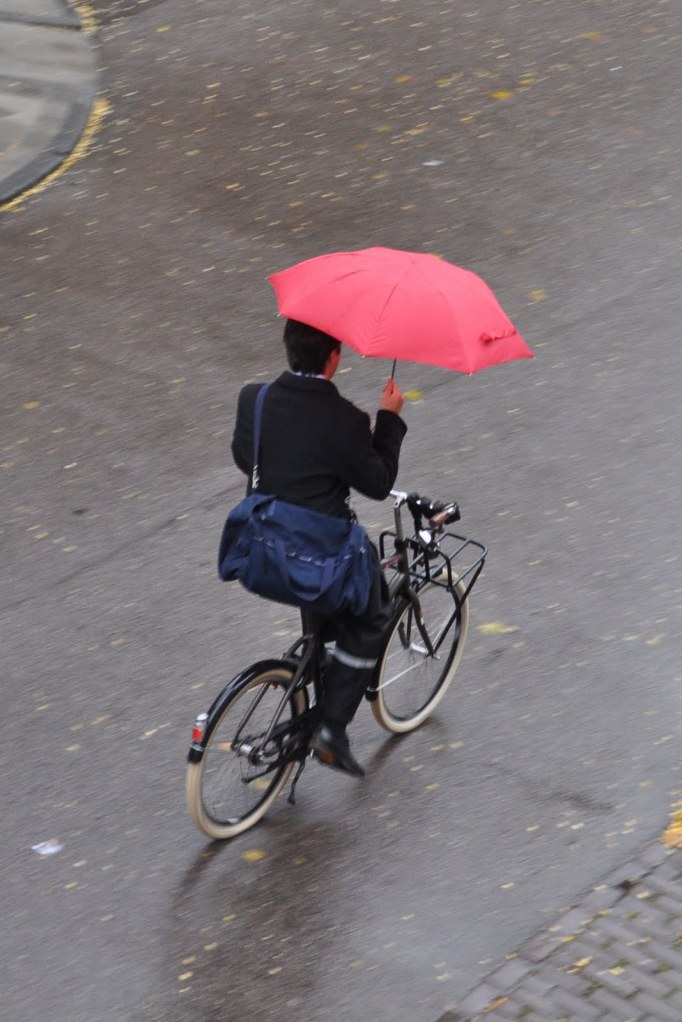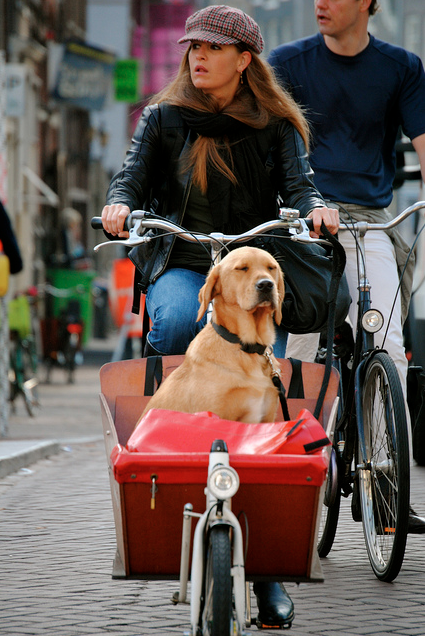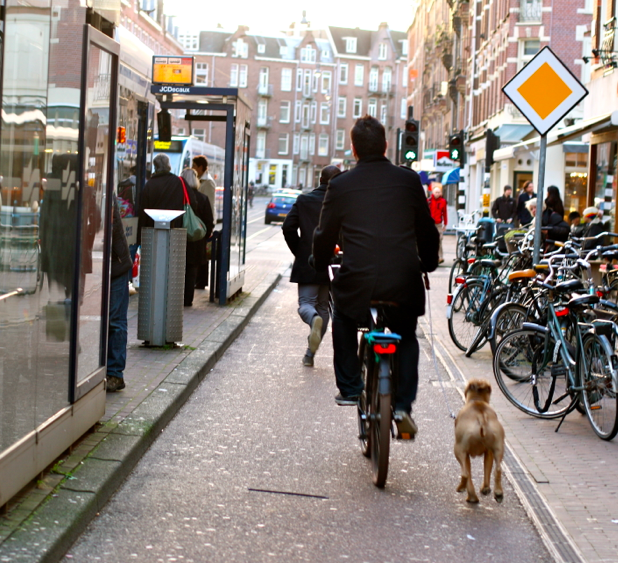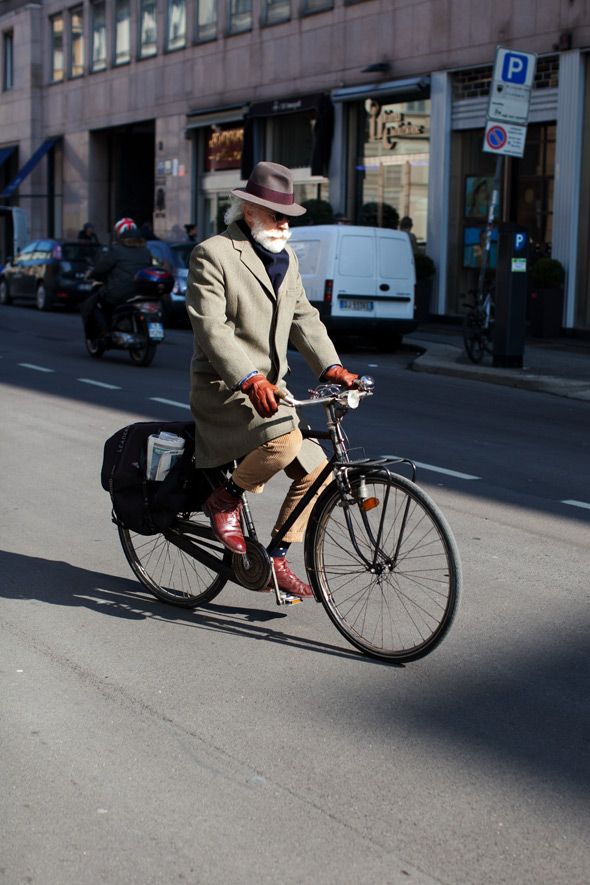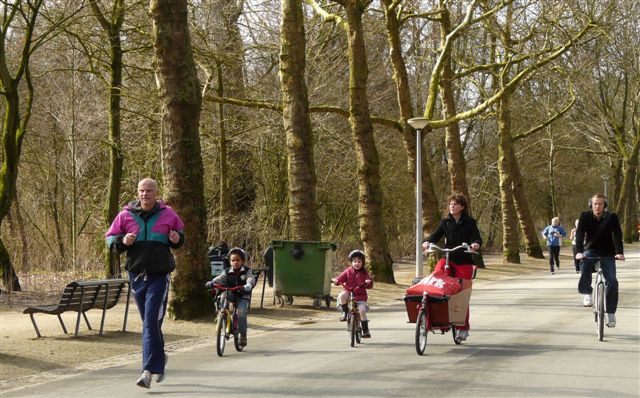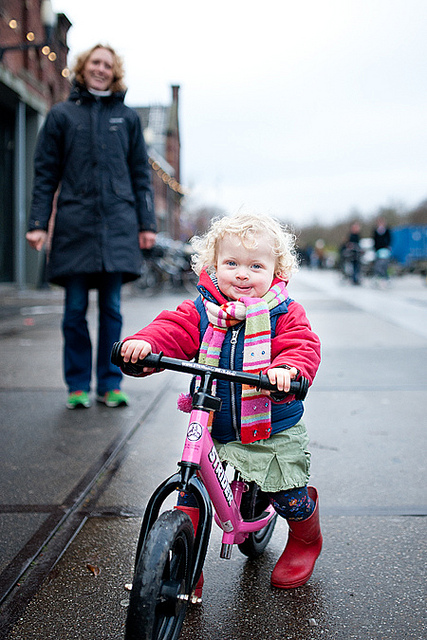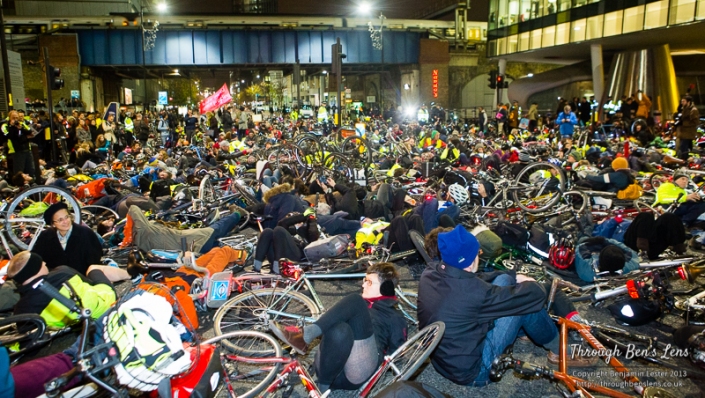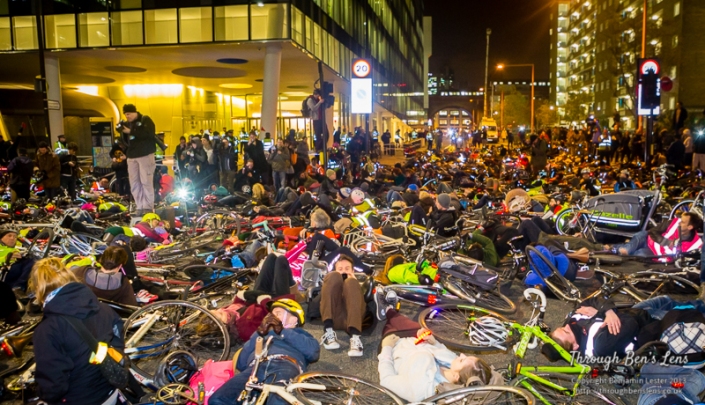Strict Liability Laws
Has cycling become a part of British life?
Link Posted on Updated on
Has cycling become a part of British life?
This article from The Guardian’s cycling blog explores the question of whether or not cycling has become a part of British life, and, if so, just what sort of cycling culture the UK might be said to have. The author describes British institutions like Brompton and Rapha, and holds them up alongside our comical cycle infrastructure (examples here, here, and here), the numerous ghost bikes that line our streets, and the lack of legal protection that British cyclists have compared to our continental cousins.
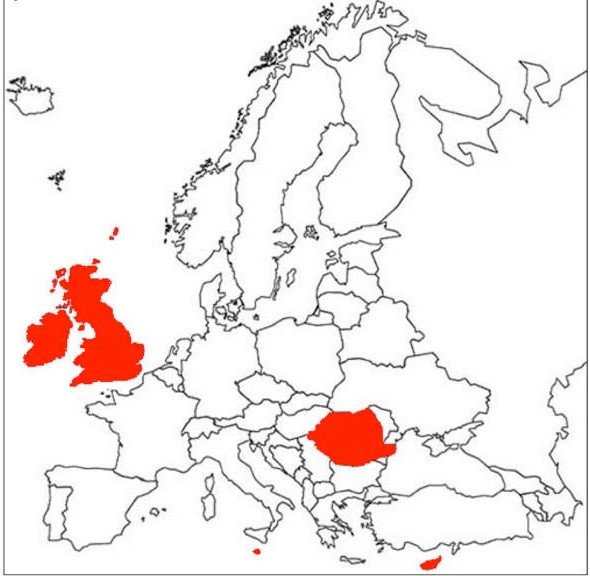
This article was published just over a week after myself and a few members of Edinburgh’s Critical Mass ‘Pedalled on Parliament’ in what has now become an annual tradition. Attracting thousands of participants from up and down the country, the ride is intended to highlight the need for greater investment if Scotland is to meet its cycling and emissions targets by 2020. At the end of the day it was a fun ride, and our sound-system proved to be a great success, but sometimes I think that it would be nice to live in a country where such rides were simply unnecessary.
Hitler the Road Nazi
Video Posted on Updated on
Hitler rants about bicycles and reacts to Premier Ted Baillieu’s recent remarks that the registration of bicycles is not feasible.
Nikki Sinclaire (West Midlands European parliamentarian) has echoed Hitler’s sentiment in calling for compulsory cycle registration and helmet use.
Cycle registration is a contentious issue, but to me it seems absurd for anyone to seriously suggest erecting such significant barriers to cycling at a time when there are too many cars on the roads and the nation’s health is so poor.
Some politicians seem to be under the impression that cyclists are anarchists who disregard the rules and their own safety for no particular reason. Although I don’t condone red-light jumping and pavement cycling (two of the most controversial issues), there are strong arguments and hard data in support of the fact that such behaviours are sometimes justified in light of their being the safest options at certain junctions. This being the case, what is perceived as the ‘bad behaviour’ of cyclists is symptomatic of the poor conditions that British bike riders have to put up; not only do we lack the strict liability laws employed to protect vulnerable road users across Europe, but our cycling infrastructure amounts to little more than inconsistent and unenforced dabs of paint.
If politicians like Nikki Sinclaire want people on bikes to behave better then maybe they should spend more time learning about how successful cycling cultures work and less time proposing preposterous new rules that do nothing to protect cyclists whatsoever.
Cycling is not (intrinsically) dangerous
2013 saw many articles written under titles referring to the ‘dangers of cycling’. A few random examples can be found here, here, here, and here. This one even talks about the ‘terrors’ faced by cyclists on the road.
Indeed, cycling can be a dangerous activity, but this is not because cycling itself is dangerous…
For instance, it isn’t dangerous to cycle without a helmet
It isn’t dangerous to cycle without hi-viz
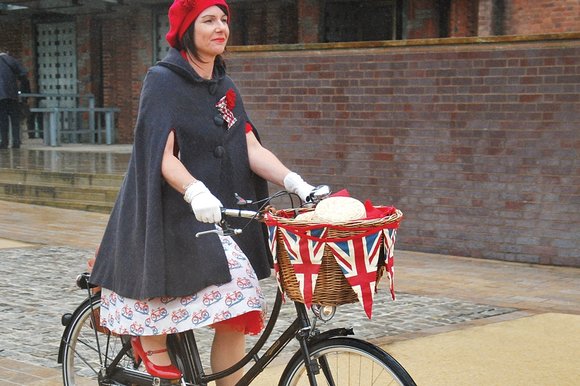
It isn’t dangerous to cycle with a passenger…
…no matter what age you are!
Even a couple of passengers (and a suitcase) is no big deal
Cycling with kids isn’t dangerous either
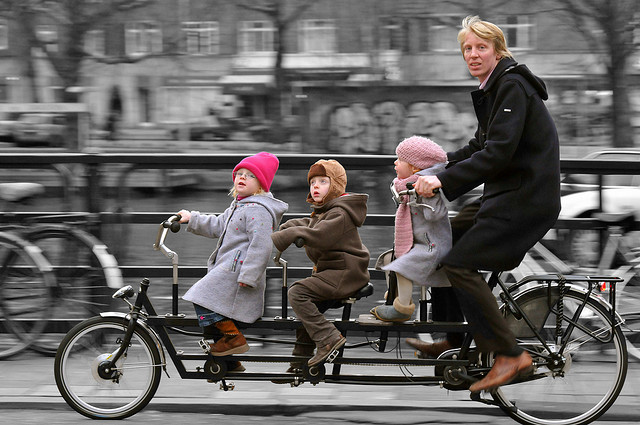
and it isn’t dangerous to cycle with an umbrella
It certainly isn’t dangerous to cycle next to your friends
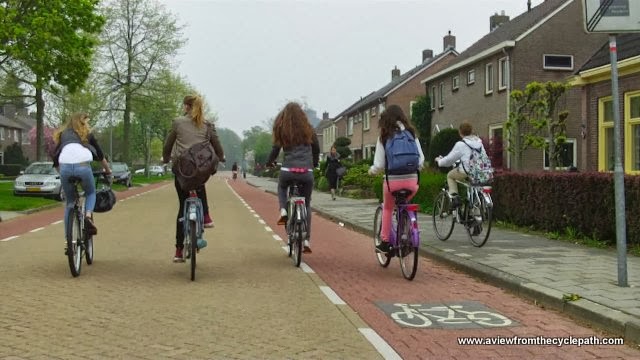
Even four-legged friends are safe to ride with.
Whether you’re a little bit older…
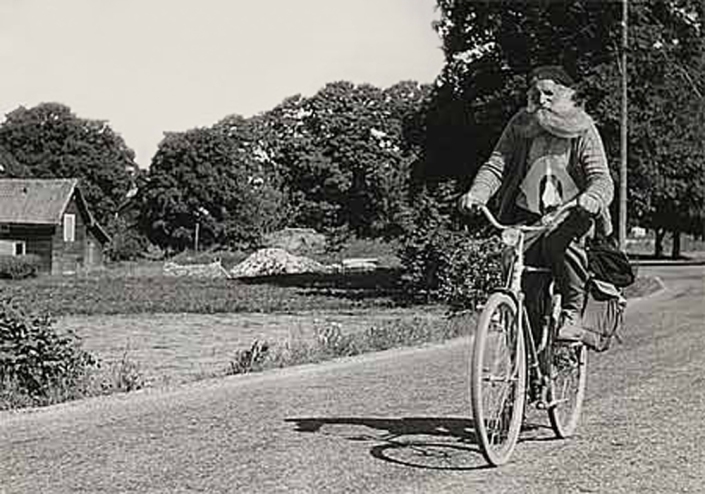
…or a little younger
…cycling itself is not a dangerous activity.
What these photographs illustrate is how the physical environment affects the relative danger of riding a bike. Many of the pictures also show how good infrastructure is the key factor in determining whether or not cycling is actually safe.
As we move into 2014, I am hopeful that governing bodies in the UK (and elsewhere, for that matter) pick up on the merits of cycling and do what is needed to protect people who ride bikes. At present (and from my perspective), city dwellers face an unappealing trilemma when deciding upon transportation; they can either:
1. Contribute to the city’s pollution and congestion by paying through the nose for a car (+driving licence/insurance/MOT/VED/petrol/parking etc.).
2. Pay to take crowded/crappy (and notoriously unreliable) public transport.
3. Ride a bike but risk their lives by sharing the road with heavy/powerful/fast moving motor vehicles.
If a person is able to ride a bike (i.e. if their health permits it), then it should be in everybody’s interest to support them. Biker riders take up less space on the roads, and so there is less congestion for everyone else; they are not pumping out pollution into the air that we all have to breath; they are exercising their bodies and so easing pressure on an NHS that is currently strained by an obesity epidemic; they aren’t damaging the roads to nearly the same degree that other vehicles do (thus saving tax-payers money); they don’t run people over (and if they do, injuries are usually minor); and last but not least, motor-vehicle dominated cities are noisy and unpleasant places, and so bikes offer a quiet and civilised remedy to this.
I think that cycling is brilliant, not just for the bike rider but for the world. I intend to keep up the pace this year with my campaigning, and I hope to keep you updated with any developments/innovations that might be of interest.
All the best
Dinosaur MPs on Britain’s Transport Committee
Link Posted on Updated on
Dinosaur MPs on Britain’s Transport Committee
For the many of you fortunate enough to not view the committee’s near two-hour session about cycle safety on Monday afternoon, I can tell you that there are scarcely enough words to describe how disheartening and shambolic it was. To give you a flavour of one journalist’s reaction, follow this link to see a collation of running tweets from the event.
The session followed the recent deaths of six cyclists in London and saw the 11-member committee first quiz a series of cycling representatives and police, then a trio of bigwigs from the road haulage world, along with Andrew Gilligan, cycle adviser to London’s mayor, Boris Johnson, and an expert from the Transport Research Laboratory.
For the most-part, it seemed as if the MPs were concerned with minor issues. For instance, Sarah Champion (Labour MP) wondered whether helmet use could be made compulsory. How a bike helmet is supposed to help someone crushed by an HGV is something that we might wonder in response… The headphones issue was also raised.
Following this, Jason McCartney (Tory MP) asked if there was a war going on between cars and bikes. His party colleague, Martin Vickers, then asked – and he was being entirely serious – if the panel felt cyclists should “contribute” financially to the upkeep of roads. Yes, that’s right. The road tax question, the litmus test for someone who not only doesn’t understand the very basics about cycling policy but hasn’t the barest minimum of intellectual curiosity about it. Silly enough in a pub conversation. For an MP, let alone an MP on the transport select committee, let alone an MP on the transport select committee discussing cycling, it’s unforgivable.
An extract from a Guardian article on the subject encapsulates some real truths about how cycling issues are addressed by the people in power:
“…when it comes to cycling policy in Britain, we remain, for the most part, in the age of the dinosaur. The odd politician talks an occasional good game on bikes, but look at too many mainstream MPs and we’re right back in the 1960s, where bikes are a toy, or a faddish “pursuit”, perilous and mistrusted, while all must lie down in homage to “the economy”, a narrowly-defined set of interests with motorised pistons beating at their heart.”
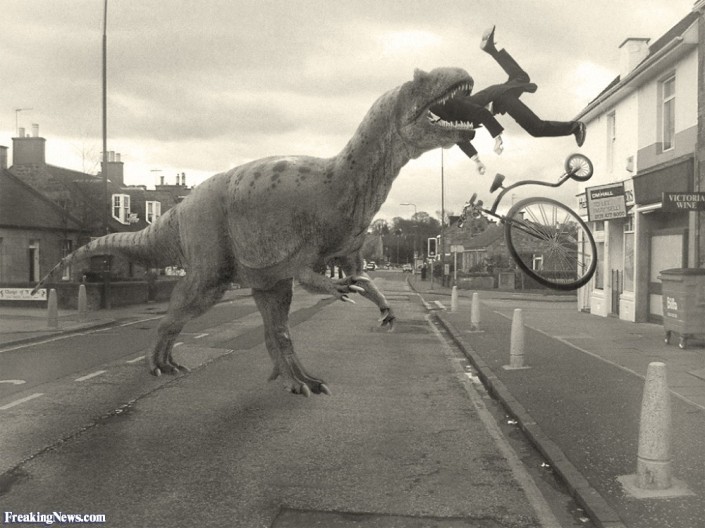
Jim Dobbin (Labour MP) then proceeded to regale the committee with a series of anecdotes about misbehaving cyclists and scratched car paintwork before suggesting that currently cycle safety woes could be addressed by requiring cyclists to register themselves and their bikes, and to pass proficiency tests in order to gain a cycling licence.
Although many people may believe that Dobbin’s prescription is a good one, it is worth remembering that not a single country on this planet implements these things for the simple reason that they massively curtail bicycle use. Bicycles don’t have the capacity to be the killing machines that cars and lorries sometimes are, and cyclists don’t produce CO2 or damage the roads to the same degree as motor vehicles; requiring them to be registered and licensed (presumable at some cost) seems a preposterous and misguided contribution to a meeting about cycle safety. And while cycling proficiency is a reasonable issue, no one at the committee meeting seemed aware of the bikeability scheme.
Part two was possibly even more depressing still. The MPs, who had been quite interrogative towards the cycle groups (albeit mainly on irrelevancies) gave the haulage group representatives a far easier time. Jack Semple, policy head of the Road Haulage Association, was left utterly unchallenged when he repeatedly singled out cyclist behaviour as the reason for them being killed by lorries; an assertion for which there is, as far as I understand, no evidence.
What was missing from the committee meeting was an acknowledgement of the fact that cities are changing places. Whereas once they competed on things like skyscrapers and parking spaces, the most desirable cities in the world are now places where there is an emphasis on liveability – a more human-centred approach. People don’t want to live with urban motorways and the noise, congestion, and pollution that they bring with them. The nicest cities are more pedestrianised, with pavement cafes, and safe, communal spaces. They also prioritise (and even incentivise) walking and cycling in such a way as to make them more convenient than driving (just look at Groningen in The Netherlands for the perfect example).
To illustrate this point, it is worth noting that there are three big annual lists of the world’s most liveable cities. Not one of them features anywhere in the UK.
Things clearly need to change, and the mass extinction of political dinosaurs seems to be a necessary first step.
London Cyclists stage mass ‘die-in’
Following the recent deaths on London’s busy streets, cyclists in the capital held a vigil and protest outside the headquarters of TfL (Transport for London). Despite the cold we lay down next to our bikes and made a pretty bold statement that TfL can no longer ignore.
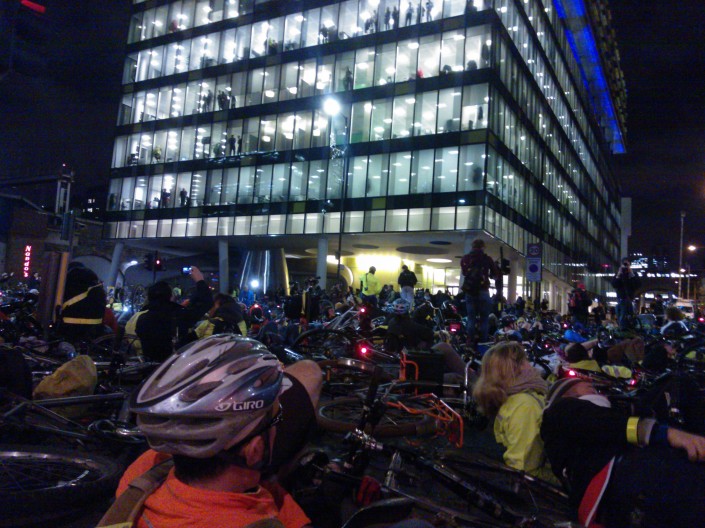
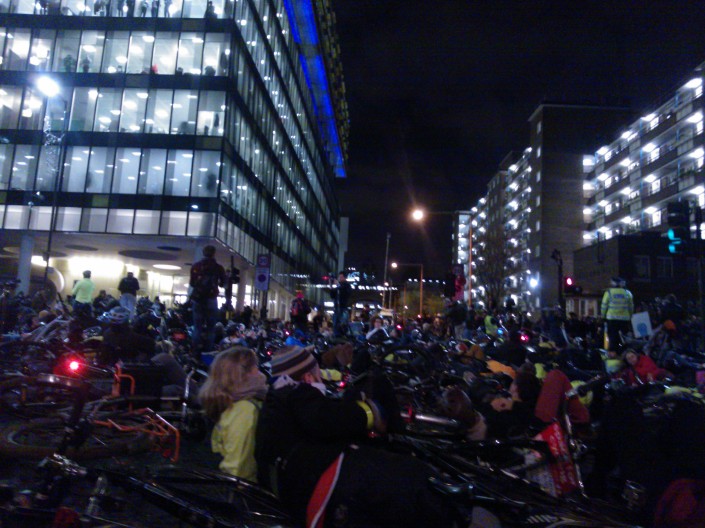
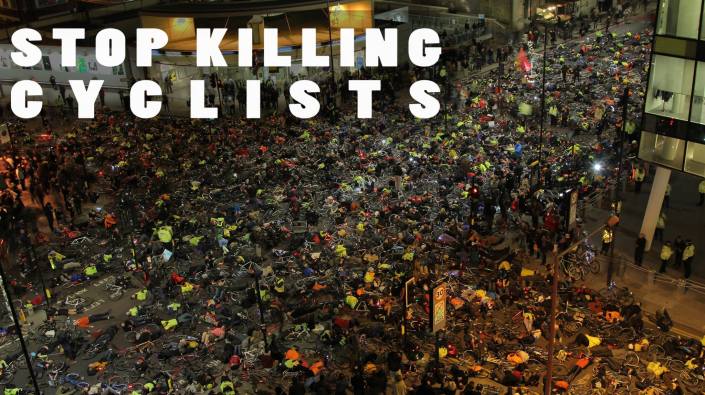
London’s die-in was reminiscent of the famous Dutch die-in that took place in the 1970s on the museumplein outside the Rijksmuseum.
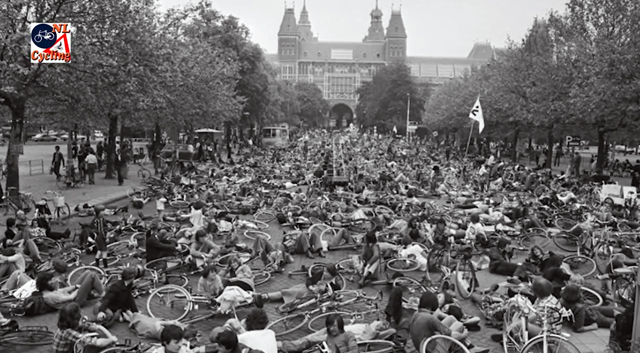
The Dutch campaign was motivated by the number of people (particularly children) who were dying on the roads. Their protest achieved remarkable things in terms of their infrastructure, and 40 years down the line they are still reaping the benefits.
Dutch solutions to London’s problems aren’t really so radical, and their implementation would only requires a modest degree of commitment from the government.
Look at how they deal with HGVs and roundabouts – surely this sort of infrastructure is desirable for everyone, no?
On a side note, my sister was interviewed by the BBC during the protest, and her vox-pop even made it onto the evening news! I will try to upload a video, if I can find one…

And the BBCs coverage of the event (my sister at 1:04)…
and another one…
Related articles
- Cyclists lie outside Transport for London (TfL) headquarters to protest road deaths (express.co.uk)
- Thousands of cyclists lie down in the road for rush hour protest outside TfL’s Blackfriars HQ (standard.co.uk)
- http://www.huffingtonpost.co.uk/2013/11/29/stop-killing-cyclists_n_4361265.html?utm_hp_ref=uk
- http://www.bbc.co.uk/news/uk-england-london-25160874
- http://www.cyclingweekly.co.uk/news/latest/541453/cyclists-stage-mass-die-in-outside-transport-for-london-offices.html
Transport Planners please take note
Video Posted on Updated on
Transport Planners please watch this.
Re-blogging this from a friend in NE Lincolnshire
The video shows some pretty dangerous situations that cyclists in the UK have to deal with on a daily basis.
Although the examples are pretty shocking, they are far from unusual.
I think the video speaks for itself and calls for better infrastructure to protect the most vulnerable road users.
The guy in the last shot was actually riding on one of London’s cycle super-highway, and clearly shows how a dab of blue paint on the road does nothing to protect people on bikes.
Look here to compare with how the Dutch deal with HGVs.
John Snow calls for improvements in cycling infrastructure
Video Posted on Updated on
http://www.bbc.co.uk/news/uk-politics-25046751
Veteran journalist John Snow is also an avid cyclist.
He has commuted by bike both to and from work every day for the last 40-odd years, and he raises some valid points about the dangers of riding a bike and the inadequacy of cycle safety provisions.
He talks about the probability of ‘big rewards’ for the first politician to re-draw the urban map and prioritise cyclists and pedestrians. In terms of combating obesity, reducing pollution, and making our cities more pleasant places to live, I think I can see why such a measure would be well received.
He states that, as humans, we respond to our surroundings. On the issue of cyclists who flout the law, the point he makes is that good behaviour will come when there are good provisions to protect and facilitate cycling. At the moment, it is a dog-eat-dog world out there on the roads; as the underdogs, cyclists are therefore put in a position of vulnerability, and have to make the most of their situation. Snow doesn’t condone bad behaviour on the roads, but he can at least appreciate why it happens.
Also of interest: http://www.bbc.co.uk/news/uk-25013438 and http://www.bbc.co.uk/news/uk-25014296
Related articles
- VIDEO: Snow’s verdict on dangers of cycling (bbc.co.uk)
- Cycling policy ‘getting better’ (bbc.co.uk)
8 radical ways to protect cyclists
Link Posted on Updated on
8 radical ways to protect cyclists
The BBC have posted an article proposing 8 different ways of protecting people on bikes.
Interestingly, instead of simply copying the exemplary Dutch solution, they suggest wacky and impractical things like ‘elevated cycle routes’ and ‘body armour’ for cyclists.
How about strict liability laws and a better network of segregated cycle paths? Come on guys, they’ve shown us how it works on the Continent, it’s about time we stopped farting about with pie-in-the-sky ideas and got our act together.
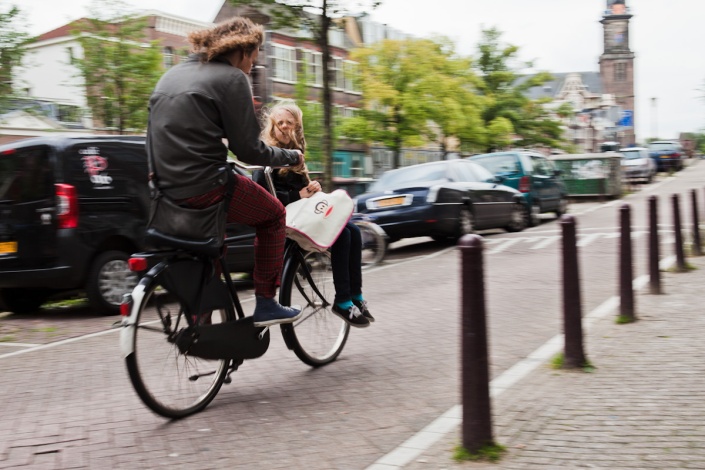
Related articles
Upgrade London’s CS2 to Continental Standards – call to arms
Link Posted on Updated on
Upgrade London’s CS2 to Continental Standards – call to arms
Five cyclists have died in the last nine days on the streets of London.
People are justified in their anger that cycling infrastructure is too sporadic to offer any effective protection. Please help by sending a message to London’s mayor to let him know how you feel.
Coverage from the BBC paints a fuller picture
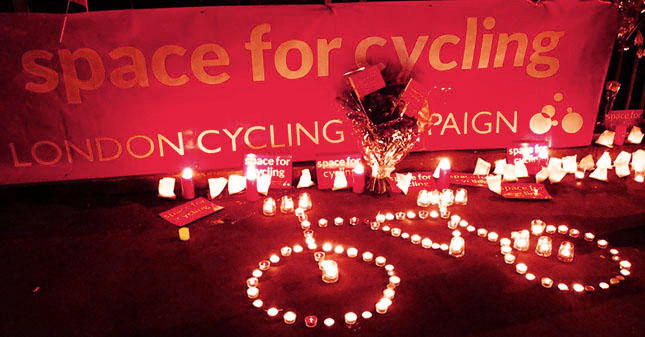
Related articles
- Cycle deaths leave London bewildered (bbc.co.uk)
- Cyclist killed on cycle superhighway (bbc.co.uk)
- Boris Johnson called on for cycle superhighway safety measures after Bow cyclist death (express.co.uk)
- One Step Forward, Two Steps Back: What Next for Cycle Safety in London? (sustainablecitiescollective.com)
A post about roundabouts (of all things)
Video Posted on Updated on
The Dutch have done it again; as usual paving the way with an innovation that is as beautifully engineered as it is practical. Constructed between Eindhoven and Veldhoven, the new ‘hovering’ roundabout separates bicycles from the motor vehicles below, harmonising high-functionality, aesthetic appeal, and plain old-fashioned genius.
My initial reaction of awe quickly turned to irritation as I realised that I don’t live in The Netherlands any more. This morning’s emotional roller-coaster took yet another turn as jealously turned to joy when I caught wind of plans for more conventional Dutch-style roundabouts to be trialled in the UK: http://www.bbc.co.uk/news/uk-england-london-22347184
For those of you who are unfamiliar with how Dutch roundabouts work, check out this brilliant video from our friends at NL Cycling: http://www.youtube.com/watch?v=XhqTc_wx5EU
Dutch roundabouts are intuitive to use once you understand how the shark-teeth markings on the road indicate priority, and there’s really nothing to it. Roundabouts can be pretty dangerous and intimidating places for cyclists in the UK, but in The Netherlands they are a breeze. Transport For London (TFL) has raised concerns that the Dutch design might reduce the speed of motorised traffic. Personally, however, I don’t see that as a cause for concern, but rather yet another benefit of a concept that prioritises the most vulnerable road users.
If the UK is realistic about meeting emissions targets, combating sedentary lifestyles, and generally improving the nation’s health then a great way to do this is to incentivise cycling by introducing measures to protect and prioritise people on bikes. It frustrates me when such a simple and elegant solution to so many of our country’s problems exists within tantalising reach but remains obstructed by a system that perpetuates antiquarian notions of cars as symbols of progress and success.
Russell Brand was wrong to tell the youth not to vote; we need to vote, and we need to vote for some serious change if we want to see it happen in our lifetime. It’s hard to believe, but until the mid-seventies the Dutch had a car-centric culture and a government who gave little or no consideration to bicycle infrastructure. The people got angry, voted for a left-wing government, and good things started to happen; laws changed, cycle paths were build, and road deaths decreased dramatically. I really don’t understand why we can’t do the same.

